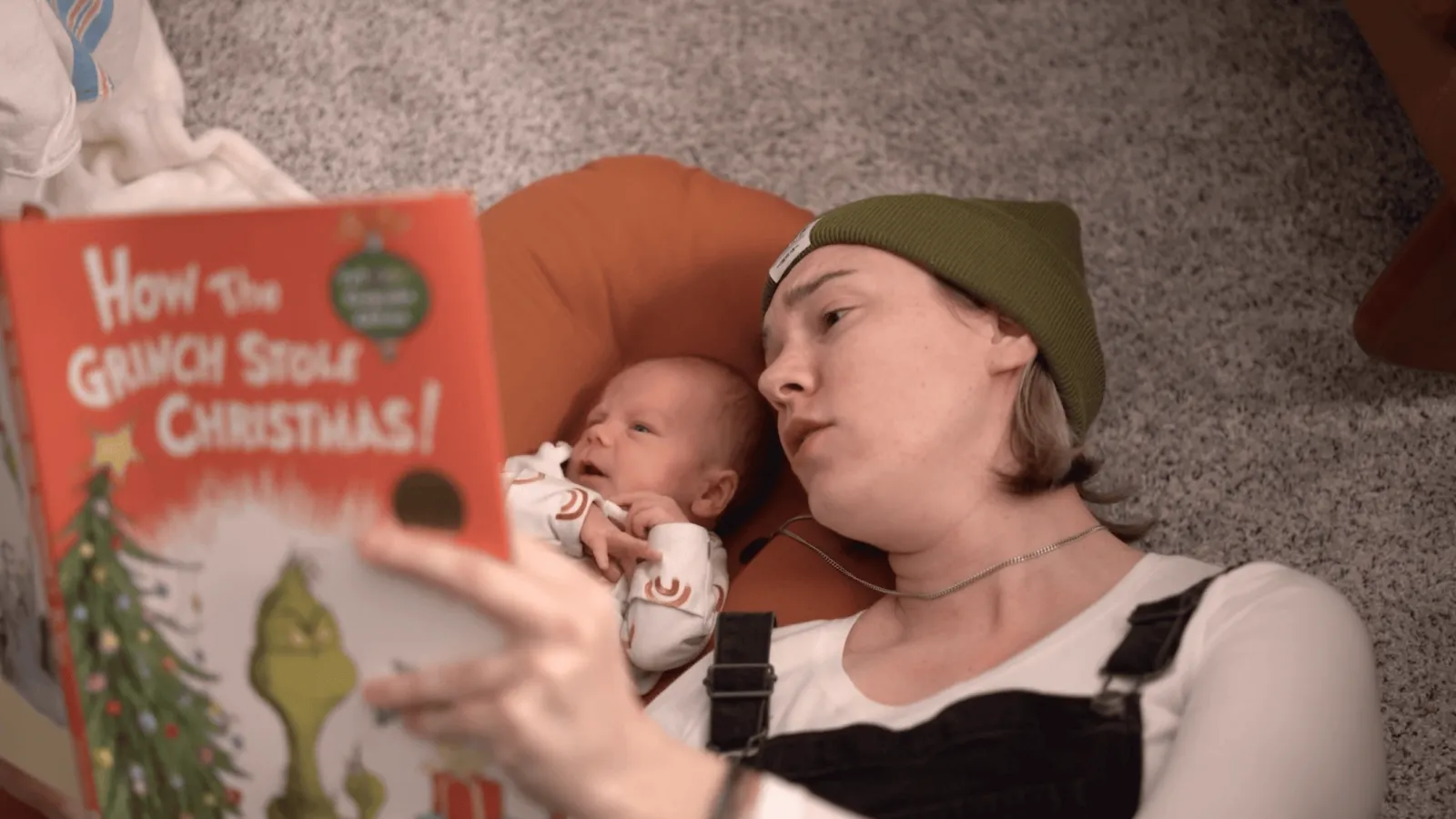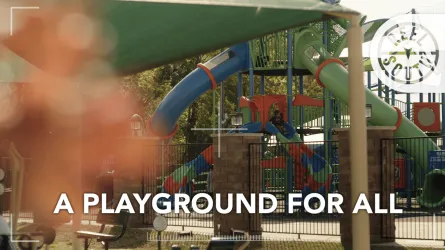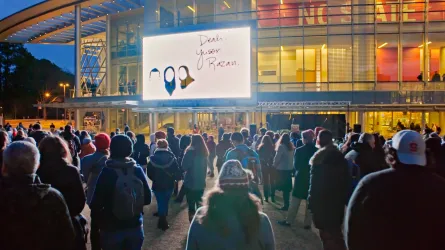Reel South's series producer Nick Price spoke with filmmaker Kiersten Houser about the making of her film, Mother(s) & Son, which Reel South premiered this week. The film is a first-person account of the filmmaker's journey alongside her pregnant wife in becoming parents and the red tape involved for LGBT+ families navigating gender-restrictive state laws. The interview has been edited for clarity.
Nick: This is your first film as a solo director, right, and it's perhaps the most personal of topics we could imagine, how did you know this was the first story you should document and share with the world?
Kiersten: While this wasn’t my first directing credit, it was the first in which I became a subject. In the beginning, my only goal was to give my son an opportunity to see his roots, to experience his journey into the world. This film was born mostly out of my own insecurities— about motherhood, missing important, fleeting moments, and bonding with a non-biological child. Would he even like me or consider me his real mom? We realized others in our situation may be able to connect with these same fears, so we set aside our anxiety and hoped it would reach the right audience. Thanks to so many people/organizations, including UNCW’s Film Studies Department, RiverRun International Film Festival, as well as you folks at Reel South, we found that audience and hope it creates a ripple effect for similar stories.
Nick: What pros and cons did you weigh?
Kiersten: I didn’t originally understand that I was actively avoiding my parental anxieties when filming, so that played a huge factor in a negative sense— at least in the beginning. When you’re behind the camera, you’re an observer, not an active participant. Ultimately, I recognized I was avoiding those fears, but I was able to overcome that by including my own voice and my own experience in the film. That was one con-turned-pro. Another was the filming itself. Megan isn’t a huge fan of being in the spotlight, and she’s often uncomfortable in front of the camera. Being recorded all the time was a huge adjustment, and at times, I’m sure, super annoying. Here she was forming a life, and I was bugging her with questions and interviews and capturing raw vulnerability and her changing body. In the end, we are both pleased we went through with recording those moments, even if it was seemingly intrusive at first. It helped tell a story— our story as a family. To that end, we have the biggest pro of all— we get to share these beautiful moments with Boone.
Nick: How did you approach this idea with your wife?
Kiersten: We both knew this would be such an important process to document, so there was never more than a “yea, let’s film this” kind of conversation. Megan’s only request was that I not allow my need for footage to impede my involvement in front of the camera. I had to stay present. In hindsight, this was an incredibly wise ask. I suppose she knew I’d become hyper-focused on obtaining as much as possible, and she didn’t want either of us to get lost in the footage when the important stuff was right in front of us.
Nick: Your story intersects with hugely important aspects of the gay experience that are often overshadowed by big, beautiful abstractions like love and equality—which are of course the challenges with governmental services, paperwork and filings, and the physical dealings with the government. Did you think about this when making the film, was it the intention or expectation?
Kiersten: Though any specific confrontation with the government in our story was happenstance, we do see the mile-long red tape within government as it pertains to “otherness,” not just in the LGBT+ community. We’re proud to have highlighted, even in just a small way, our experience with gender-restrictive state law within the adoption process, which needs reform in circumstances like ours. What’s important to note is that our personal experience in the South, in recent years especially, has been incredibly positive. Most people are supportive and open-minded— a far cry from the legislators and politicians that represent them so poorly, or the media which paints an altogether ignorant portrait of the American South.
Nick: The South has one of the largest queer populations and we are releasing this film at a time when many southern and conservative states are actively passing legislation that impacts the lives of gay families. What does that mean to you?
Kiersten: What’s most important is that we’ve been given a platform to screen our story at all, especially in such a strange and worrisome time for LGBT+ families in this country. We hope our story can help demystify the myth that we are somehow brainwashing our children or harming society by sharing that we exist and educating our children about all types of love and identity. All we have are good intentions, and the same can be said for other families like ours. Megan and I often forget our love is any “different." Being queer is secondary. Being good parents and open-minded people are at the forefront for us.
Nick: What responsibility do you feel, if any, to speak to or for other families around the region, like yours, that are under constant pressure legislatively?
Kiersten: In the short screening time of this film, it’s shocked me how many people have connected with our story. When we made this film, it wasn’t my priority to make any sweeping political statements or to speak for anyone else, but after discussing what the film means to so many LGBT+ families, it puts things into perspective. In sharing any story, however personal, we take on an active role in the education of the subject matter. If nothing more, I hope others will feel compelled to share their stories, too.
Nick: In terms of filmmaking, you do a wonderful job writing and narrating the film. When and how did you decide that device, your central monologue, would be the central perspective?
Kiersten: In a way, I always knew it would be a love letter to my wife and son— from me. My wife did the hard work of creating Boone, giving him life, and so I felt it was my job to give them the only thing I knew I could in return: their story, which is lovingly wrapped up in my own. The narration worked well in tying the mostly-observational footage together with my own personal inclusion.
Nick: In such a tightly and succinctly told story, what do you wish you had had more time to tell. What would a theoretical sequel to this film include?
Kiersten: Theoretically, I’d love to give more information about the adoption process. The legal system is tricky and tough to navigate, and there are so many misconceptions in a situation where a same-sex couple has a child. The legal system isn’t designed for families like us. We had no idea I had to formally adopt Boone until we spoke with a lawyer. Many same-sex couples, like us, thought all we needed was to put our names on the birth certificate to make it legal and “legit," but it’s much more complicated than that.
Nick: Lastly, what's next for you as a filmmaker and as a parent in this still fraught time?
Kiersten: We do our best to live in the moment and enjoy our time as a new family. We still record him a lot, and I find ways to incorporate him into my work, including continuing this project for as long as I can— just documenting Boone. His birth and my relationship with him as a non-biological parent impacted a narrative short I’m now working on called “Hunger Pang” in which a zombie woman (yes, it’s a gore-light zombie movie!) finds a baby and must decide whether to eat it or keep it alive. Since food is scarce and she’s starving, she struggles to fight her urges, but her unlikely bond with the child soon poses a problem for her appetite. The story, despite its genre, is a quirky (and sometimes comical) tale about love, connection, and moments that “wake us up” to life’s most treasured moments. But as a parent, I hope to live up to those beautiful women in our lives who call themselves our own mothers (Erica & Cyndi)— not easy shoes to fill!
Category
Share


